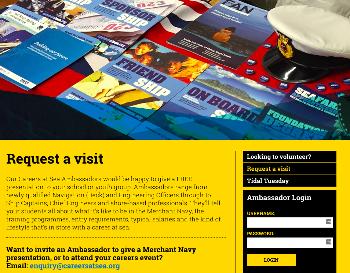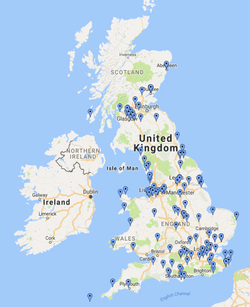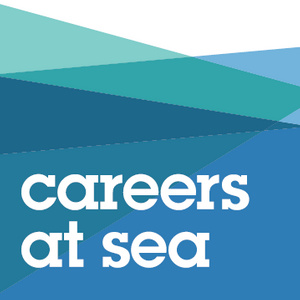Careers at Sea Ambassadors
Success achieved
Providing detailed careers information on the opportunities available within the Merchant Navy to a new audience.
- Website
- http://www.careersatsea.org
- Project dates
- 2016 - 2017
Project team
- Fena Boyle, Training and Careers Manager
Tools & Systems
A colour coded outlook calendar system is used to keep track of requested visits, those sent out to the Ambassadors and the ones that have confirmation of an Ambassador attending. Emails are our main source of communication with the Ambassadors and they allow us to update everyone on the feedback we receive, the plans for the future of the programme and the visit requests.
There is a new private Facebook group where Ambassadors offer support, share experiences and ‘buddy-up’ with another Ambassador for certain events. This, as well as social media, encourages the Ambassadors to talk to each other and to share what is going on so that we can accurately record the level of activity taking place.
Introduction
With 95% of UK trade coming by sea, the Merchant Navy is valuable to the UK, but very few people know of its existence let alone the opportunities available to them within it.
The Careers at Sea Ambassador programme is made up of over 340 volunteers and aims to reduce the lack of awareness of this vital industry to the young people of the UK, whilst promoting the exciting career opportunities ranging from catering and hospitality roles, to perhaps being the captain of a vessel. Ambassadors are current and former serving seafarers who highlight their own careers in order to engage with young people and to increase diversity and gender equality within the Merchant Navy, as only 7% of UK seafarers are female.
Maritime apprenticeships are currently being developed to counteract the ageing workforce and the Ambassadors are able to promote these roles, as well the need for more engineers and electro-technicians in the maritime sector.
Discovery
Schools provide an extensive range of careers advice and the Careers at Sea Ambassador programme has looked to connect with teachers on their own forums and with careers advisers on social media to increase the visibility of careers in the Merchant Navy.
We illustrate that the service is free, materials are provided and Ambassadors provide their own experiences to provide an engaging careers discussion at no cost to the schools. This research has been done by talking to other organisations trying to connect with schools and by watching social media conversations. When we see that careers advisers have invited the Royal Navy to an event, we suggest that our Ambassadors are invited too.
New entrant officer trainees highlight that they only knew about careers in the Merchant Navy due to a family member or friend having done it before them therefore illustrating there is more work to do. Until this is no longer the case, Careers at Sea Ambassadors will always have a place in promoting careers.
Objectives

2015 was a successful year, so it was decided that the Ambassador programme would try to gain 100 visit requests for the year 2016/17 with 50% of them being attended.
Only 38% of the 61 visit requests in the UK were attended in 2015 but in 2016 this rose to 64% with 109 of 170 visits attended. So far in 2017, there have been 225 requests with 144 attended.
It was also important to try and get Ambassadors from the Midlands to engage with the programme and attend schools in those areas and this was highlighted in certain articles written for the union newspaper.
350 Ambassadors was the ‘recruitment’ goal - a significant amount of work would need to be done to achieve this number .
Activities
It was determined that in order to get to as many schools in a year as possible, we would need to ‘recruit’ more Ambassadors on to the programme. We have worked with our social partners to advertise the programme to a range of companies and individual seafarers and since January 2017, 40 seafarers have signed up to volunteer.
By speaking to volunteer Ambassadors, we have been able to work out what does and doesn’t work when they attend careers fairs. We have used information to refine our processes, connect with schools better, share visit requests and create suitable materials to connect with young people. We now have bright and engaging banner stands which create a presence for our Ambassadors and as a result of a supportive Facebook group, Ambassadors are able to share experiences, feedback and requests they are unable to attend, making the whole programme much tighter.
The Careers at Sea programme also collaborates with its social partners and national campaigns to raise awareness of the careers available in the Merchant Navy. We work with Seafarers UK on their maritime focused ‘Seafarer Awareness Week’. This year eight out of twelve events scheduled were attended, the highest number ever for Careers at Sea Ambassadors. We also work with ‘Inspiring the Future’ and their sister campaigns to show that careers in the Merchant Navy are accessible for most people and ensure that the media capture the involvement of the Ambassadors.
Innovation
The main source of innovation created in the last 12 months has been the level of responsibility given to the Ambassadors to make this programme a success. Without their thoughts, leadership, initiative and feedback, this programme would not have had the success it is currently subject to. The onus being on the Ambassadors to talk with one another has helped to improve the programme and allow us to work with them to target people in the right way. When an Ambassador has an idea for improving the programme, which is then shared with the others, it creates a unified project that allows us to move forward with one message. Their needs and wants are taken into consideration and as an organisation we are able to help them share their passion for the industry.
Marketing
Marketing for the Careers at Sea Ambassador is limited, but effective. Schools are contacted one by one and the programme is currently supported by a training management company within the Merchant Navy who has included it on their school mailing list. Ambassadors use our standard letters when contacting their local schools and youth groups. We promote the programme and recruit Ambassadors in our union paper, on social media including LinkedIn. We also create threads on forums read by teachers. We engage with conversations on Twitter and use trends to engage with a larger audience. We post about the programme and tag schools and careers bodies to increase our reach.
The Careers at Sea Ambassador programme has launched new leaflets and has produced a new promotional video called ‘To Sea or Not to Sea’ which had over 20,000 views in its first week. A Facebook page communicates with schools and career advisers as well as a Pinterest page to encourage schools to bring the sea into the classroom.
Challenges
The main challenge of this programme is shipping schedules. Ambassadors are often away at sea which sometimes means they are not able to attend a visit on the date requested and no one else is local to the event to visit in their place. Some of the requests are not attended by Careers at Sea Ambassadors. The other main challenge of the programme is the location of the events compared to the location of Ambassadors. There are some areas in which we have no Ambassadors and therefore the visit requests cannot be attended.

Achievements
The programme has exceeded its expections for the year and 340 Ambassadors are now on the mailing list.
The Careers at Sea Ambassadors have attended over 64% of the visits requested by schools and youth groups, and over 225 were requests made.
This exceeded all expectations and will be a target to beat for the next 12 months.
Targets & Statistics
Statistics for this programme over the last three years can be found in our supporting evidence. We update these statistics every couple of weeks to ensure we have a clear idea of how the programme is performing. Our targets for the year are to exceed the number of visit requests we receive from schools and youth groups, and also the number of requests that are attended by Ambassadors.
Financials
Throughout the year 2016-2017 no monies were spent on this campaign. All the materials; including 10,000 pens, 25,000 bookmarks and a number of banner stands, had been purchased in the December of 2015 and the only financial cost for the programme was the postal charges and stationery costs to send the materials out to the Ambassadors. ‘Careers at Sea’ have a limited careers budget and time and consideration is taken at least 12 months in advance at how best his budget can be spent. No returned revenue is forecast as this is a not-for-profit scheme. An additional £50,000 was given in funding to produce the new careers at sea film and funding will be sought to implement the strategy for this film going forward.
What would we do differently?
We would focus a social media campaign to attract new Ambassadors especially in locations where seafaring is not normally a career choice.
Feedback & Testimonials
“As an island nation where 95% of goods arrive by sea it would be easy to assume that children in our schools are made acutely aware of the Merchant Navy and our dependence on ships for everything from potatoes to smartphones. Unfortunately just a few miles in from the coast thousands of children (and adults) have no idea of the importance of our Merchant fleet to this country or the incredible careers on offer to those who are willing and able to go to sea. According to a 2014 survey, 98% of the public are unaware that 95% of our goods come by sea. A number of organisations, MSSC included, are working towards a solution to this problem with varying degrees of success.
Although there is no silver bullet solution I can honestly say there is no other scheme, body, or organisation that has made a bigger impact reaching and educating young people who would otherwise remain sea blind than the Careers at Sea Ambassador programme. The scheme’s volunteers have visited over 100 schools in the last year and had meaningful interactions with thousands of students, raising awareness of the maritime industry, and opening students’ eyes to the exciting and varied careers available to those who want to go to sea. The Royal Navy’s recruitment marketing annual spend is £23million, by comparison the careers at sea ambassador scheme runs on a shoe-string budget of just a few thousand pounds each year and punches well above its weight.
The UK maritime industry supports 11,000 jobs at sea and ashore. As well as being an engine for the economy it is also an engine for social mobility, many of the industry’s top executives started their careers by going to sea. The UK economy is dependent on the strength of our maritime industry; the maritime industry is dependent on the skills of the people who work within it; and we can only attract talented young people into the industry through highly engaging programmes like the Careers at Sea Ambassador programme.”
Nick Chubb Business Developer Marine Society
Wider impact
We have increased the number of Ambassadors by forty in a year bringing the total to just over three hundred and forty volunteers. This has happened through involvement of the union and the maritime industry and also by Ambassadors telling their story to other seafarers and encouraging them to volunteer.
We are able to show a significant number of visits across the UK and a much larger number of young people being connected with. A 269% increase in the number of visits attended from 2015/16 to 2017/18 shows that the Ambassador programme is working and that more people are hearing about our sector. This in turn will help the sector select the highest calibre of people they can and will continue to help the sector progress.
The Careers at Sea Ambassadors have engaged more since they have seen the work of new ‘recruits’ and they are able to form solid relationships with their local schools and youth groups who are asking for visits on an annual basis.


